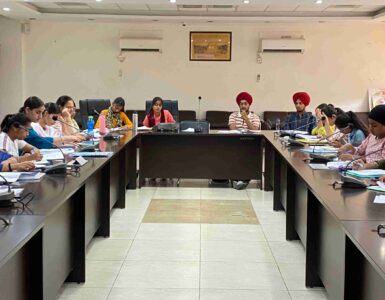The world is witnessing a significant increase in natural disasters, per the Ecological Threat Register (ETR). This is causing far-reaching consequences, and we need a holistic disaster response to minimize the impact. Disaster mitigation involves pre-disaster preparedness, evacuation from the focal area of calamity, and post-disaster rehabilitation plans. To build a resilient reaction, people should be aware of disaster mitigation.
Akal University responded to recurrent issues by organizing disaster management and rehabilitation events. The Department of Physiotherapy conducted a lecture cum demonstration session. It was delivered by the 7th Battalion National Disaster Response Team headed by Training Officer Inspector Vipin Kumar Tiwari. Through demonstration, students were taught how to act in a real-time scenario. Mr. Tiwari emphasized the role of physiotherapists in ensuring risk reduction and minimizing adverse impacts.
The objective of organizing a session on Disaster Management
The session’s objective was to raise awareness about disaster management as it is mandatory for NCC, NSS, and Bachelor of Physiotherapy students.
- To deliver this information through activities so that they can understand the situation’s intensity.
- To circulate the significance of Disaster Management and its help in risk minimization.
- Make participants aware of the required actions that should be taken immediately.
- To inform the students about the working of the NDRF Team during disasters.
- Train students in the basics of Disaster management through practical and hands-on training.
Welcoming Speech by Dr. GS Lamba, Dean of Academic Affairs
Dr. Lamba welcomed the 7th Battalion National Disaster Management Response Force team headed by Training Officer Vipin Kumar Tiwari and his team. He emphasized the importance of the lecture and that awareness is essential to address the disasters and their implications. Since these unpredictable happenings have massive potential for damage, they need comprehensive preparedness.
A Training Program by NDRF Officer Vipin Kumar Tiwari
Inspector Vipin Tiwari portrayed the program’s agenda in front of the students. Students were exposed to the basics of disaster, their types, and their implications with relevant examples such as the Gujarat earthquake in 2001, the Odisha Cyclone in 1999, the Indonesia Tsunami in 2004, etc. Further, he elaborated on the National Response Force Team’s work and needs and explained its formation. He gave details on the recruitment process of NDRF and its training in disaster management.
Since it was a lecture cum demonstration session, the NDRF team demonstrated disaster management techniques such as DCF-Drag Cover Hold, Shirt Drag, Blanket Drag, and Shoulder Drag Method. They performed evacuation drills, and hypothetical scenarios of disasters were created. NDRF responders rescued trapped victims with the help of various state-of-the-art cutting and rope rescue equipment.
Learning First-Aid Services and Rehabilitation
Participants of the lecture were taught basic first aid techniques, including CPR (Cardiopulmonary Resuscitation), FBAO (Foreign body airway obstruction), and procedures to bandage and stabilize fractured or injured body parts. Then, they were told rehabilitation techniques so disaster victims could return to everyday life.Inspector Tiwari interacted with the students to satisfy their questions.
At the end of the event, Dr. GS Lamba delivered a token of appreciation to the entire NDRF Team led by Inspector Tiwari. The event concluded with a plantation drive acknowledging that ecological intervention can help mitigate disasters and reduce the gravity of repercussions.
Akal University is eagerly preparing active, dedicated volunteers to serve humanity. It is demonstrated through activities such as the Akal flood relief campaign and altruistic drives by the NCC and NSS. This lecture was greatly helpful in disseminating the basic knowledge of first aid, delivery of necessary services, and preventing panic in such uncertain situations.


























Add comment